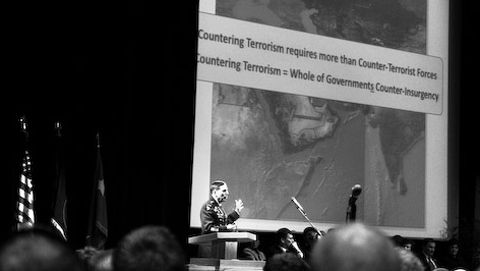General David Petraeus discusses Iraq & Afghanistan war strategy with BYU students:
Petraeus began his remarks by listing the Top 10 reasons BYU students make such great soldiers:
Number One – They understand how far Iraq has come over the past seven years. In fact, they think that Iraq’s old spot in the “Axis of Evil” can now be filled by the University of Utah.
ETA: Also making Petraeus’ Top Ten: Mormon missions, Jell-O, home teaching, food storage, and the Word of Wisdom; but no mention of polygamy, which David Hadar recently described as one of “the less endearing sides” of Mormonism in his Haaretz piece, Mr. Smith goes to Zion.

Photo Credit: Trevor Christensen
Along with covering policy over the wars on the two middle-eastern war fronts he was asked about Iran. He says that sanctions are likely coming concerning Iran’s nuclear capabilities. When asked if U.S. foreign policy is too dominated by military might, he said “yes” and pushed partnerships between Afghani people and the military, much like Iraq.
Petraeus remarks were titled Update from the CENTCOM Commander.” LDS retired general Amos Jordan arranged for General Petraeus to speak. Brother Jordan was formerly the CEO of the Center for Strategic and International Studies, which also counts fellow Mormon Brent Scowcroft as a member.
My takeaway: When it comes to discussing the Mormon role in the national scene, Beck and Romney remain little more than Palinesque low-hanging fruit. Behind the scenes, one finds Mormons anxiously engaged at every level. If Mormon identity weren’t so damn complicated, I suspect we’d hear more about (and from) these quiet plodders, and enjoy a wider-ranging discussion of the aggregate and individual impact of their efforts (or at least have better fodder for chattering about whatever John Q. Mormon might happen to be working on over at the DOJ or wherever).
Whatever honor Dick Cheney, Cardinal George and General Petraeus might bring to a campus, it’s a fraction of the glory tscc might accrue if it’d simply do its job and finally address the retail weirdness of Mormonism.
To its credit, the Bloggernacle has gone some way to establishing a relatively safe place for anxiously-engaged LDS professionals to return and report. That said, as long as the new Mormon media remains redacted by nature and fearful of the ebb-and-flow of broader public opinion, truly reality-based professionals, their Mormon/Utah alma maters notwithstanding, will not dare to engage in a Mormon-branded space. It’s a conversation that simply can’t be had as long as the LDS brand continues to be sold under the radar, so to speak. As wholesale propositions go, the brand remains adequate, but as a retail brand, end-user reception/perception is still in flux. Which is why the conversation about polygamy matters. Because it’s one of several conversations that, oddly enough (and, let’s face it, that one’s particularly odd), never seem to end. And for why that is, one can only look to the institutional church, and wonder why.
I’ve heard the notion that Mormons are “smart and capable” but when it comes to their beliefs people just don’t get how someone so smart and capable can “believe that sh**.”
Also, since I’m studying Mormonism at the graduate level, professors like to tell me about all the Mormon students they’ve ever had, as if the Mormon presence in the world is a “phenomenon” that isn’t quite real.
Has Walter Benjamin come up on your reading list? I suspect I’m not the only Mormon who relates to his experience. Perhaps you would as well. Initially enthusiastic about the German Youth Movement, growing up for Benjamin meant coming to terms with how a movement he loved had become susceptible to manipulation by political interests that he opposed.
I don’t remember where I read it, but somewhere he describes all the good that he experienced inside a project that wound up being sullied by ideology.
In other words, yeah, I’m an Eagle scout. For a boy from the sticks like me, there was nothing better than ten-mile hikes, and merit badges for tying knots and rowing a canoe and reading a compass, not to mention baking dinner in dutch ovens over open campfires. Or roasting venison.
And then it was BYU, and the mission, and the realization that I belonged to an organization that was more about social climbing than mountaineering and decidedly more phenomenon than reality.